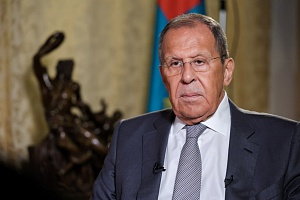Foreign Minister Sergey Lavrov’s interview for the Soviet Breakthrough documentary film project, Moscow, September 25, 2024
Question: In the 1920s, when the USSR did not have diplomatic relations with other countries, the Soviet Union decided to establish contacts with leading automotive companies to modernise its automobile industry. Despite the lack of diplomatic relations, major automakers began cooperating with our country. Does this mean that economic interest can work even at a time when there are no diplomatic relations?
Sergey Lavrov: The question contains the answer.
Can economic interest break through even in the absence of diplomatic relations? This was exactly the case in the 1920s. I would not say that the Soviet Union was pressing invitations on those specialists. The process was mutual.
Western companies, in full accordance with the concept that underpinned the United States of America – doing business – realised immediately after the 1917 revolution that it was worth it to establish connections in this country, the richest in the world, and reach agreement with its new government on doing business.
The Soviet Union, in turn, was interested in industrialising (this goal was already set). Particular emphasis was placed on manufacturing cars and trucks, primarily of the series that were crucial for the country’s defence capability. New factories were established by Ford and Autocar (another company active at the time). The first conveyor belt was launched in Russia, using the technology transferred from Henry Ford’s factories. The Russian makes ZIS (later known as ZIL) and KIM (later Lenin Komsomol Automobile Plant) were created by cooperative effort; they were cases of joint production. The Russian side started with licensed production before launching the production of a fully Soviet-made vehicle, although the manufacturers did borrow a great deal from their Western partners (in particular, the famous Pobeda car).
Those business partnerships were established at a time when we had no diplomatic relations with the United States. But the country’s government did not object to its citizens engaged in private entrepreneurship doing business in Russia at their own risk and peril. The risk and peril were very real indeed; but they paid off in the end. Critics in the United States slammed those businesses for ‘helping the communists build up their economy.’ In response, Henry Ford uttered one of his most popular phrases. He said that no matter where the industry prospered, in India, China or Russia, it would generate more profit for all. This was his vision of the future processes in the global economy. In fact, Ford predicted globalisation, something his own country is now destroying, forcefully and deliberately.
Speaking of more recent developments, the sanctions imposed by the US have hit the automotive industries of their allies hard. US automotive exports to Russia were negligible and incomparable with those from Europe – from Germany and other countries, which supplied vehicles to our country on a far greater scale. The United States effectively banned them from further cooperating with the Russian Federation. The market quickly filled – and continues to be filled – with car brands from other countries, primarily from China. Joint ventures are being established. There has been a lot of sarcasm about our auto industry being replaced by Chinese imports. This is not true. Import substitution is working. Plans are now in place to launch the production of Russian cars using Chinese designs, the same way American know-how was used in the 1920s. This is just another example of the sanctions primarily harming those who impose them – especially when undermining their own industry was the last thing they wanted, but they had to obey the hegemon. This is what happened to the European Union, with its economy (not only the automotive industry) literally undermined by the United States. The effects of Washington’s crusade to eliminate European competition will be felt for decades to come.
Question: Do Russian automakers need diplomatic support to develop their operations and promote their products?
Sergey Lavrov: Why just the automakers? Any economic matter with an international dimension requires political and diplomatic support.
The economic agenda is front and centre whenever President of Russia Vladimir Putin holds talks at the highest level with his partners representing countries with adequate governments, primarily our partners within the SCO, BRICS and post-Soviet associations including the EAEU and the CIS. Combining our efforts must be a win-win proposition for all of us.
Building a sealed economy is not an option in today’s world. Everything is intertwined, considering the complexity of production chains involving a plethora of parts and technological solutions. These matters are coordinated at the highest level. It is also at this level that the parameters for major oil, gas, nuclear energy and transport projects are agreed upon. The North-South project is very important and has a lot of potential. And there is much more than that.
Once the heads of state set the political benchmarks, this is where the economic agencies step in. This is diplomacy at its finest. Once they start implementing these objectives, the Foreign Ministry makes sure that the agenda for all the talks involving the Foreign Minister or his deputies with the corresponding countries includes practical steps to achieve the objectives as set forth by our heads of state. At the end of the day, it is by combining the instructions stipulated at the highest level with efforts by specialised agencies and diplomatic support that we can make this approach a success.




